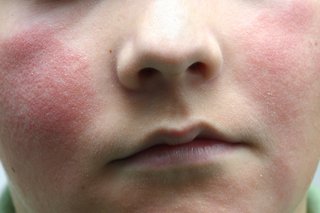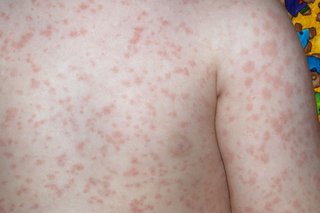Slapped cheek syndrome
Slapped cheek syndrome (fifth disease) is common in children and should clear up on its own within 3 weeks. It's rarer in adults, but can be more serious.
Check if it's slapped cheek syndrome
The first sign of slapped cheek syndrome is usually feeling unwell for a few days.
Symptoms may include:
- a high temperature of 38C or more
- a runny nose and sore throat
- a headache


How long it lasts
The cheek rash normally fades within 2 weeks.
The body rash also fades within 2 weeks, but sometimes comes and goes for up to a month, especially if you're exercising, hot, anxious or stressed.
Adults might also have joint pain and stiffness. This can continue for many weeks, even after the other symptoms have gone.
If you're not sure it's slapped cheek syndrome
Look at other rashes in babies and children.
You can also use our visual guide to baby rashes at the bottom of this page.
Things you can do yourself
You do not usually need to see a GP for slapped cheek syndrome.
There are some things you can do to ease symptoms while it clears up.
Do
- rest
- drink plenty of fluids to avoid dehydration – babies should continue their normal feeds
- take paracetamol or ibuprofen for a high temperature, headaches or joint pain
- use moisturiser on itchy skin
- speak to a pharmacist if you have itchy skin – they can recommend the best antihistamine for children
Don't
- do not give aspirin to children under 16
Important
Tell your midwife or a GP if you're pregnant or have a weakened immune system and have been near someone with slapped cheek syndrome.
See a GP if you think you have slapped cheek syndrome and:
- you're pregnant – there's a very small risk of miscarriageor other complications
- you have a blood disorder, such as sickle cell anaemia or thalassaemia – there's a risk of severe anaemia
- you have a weakened immune system – for example, because of chemotherapy or diabetes
Ask for an urgent appointment if you have:
- very pale skin
- shortness of breath
- extreme tiredness
- fainting
These can be signs of severe anaemia and you might be sent to hospital for a blood transfusion.
How slapped cheek syndrome is spread
It's hard to avoid spreading slapped cheek syndrome because most people do not know they have it until they get the rash.
You can only spread it to other people before the rash appears.
Slapped cheek syndrome is caused by a virus (parvovirus B19). The virus spreads to other people, surfaces or objects by coughing or sneezing near them.
To reduce the risk of spreading the virus:
- wash your hands often with warm water and soap
- use tissues to trap germs when you cough or sneeze
- bin used tissues as quickly as possible
You do not have to stay off work or school after the rash appears.
Let the school or teacher know if your child has slapped cheek syndrome.
Baby rashes: a visual guide

From nappy rash and eczema to impetigo and slapped cheek syndrome, use this visual guide to help you recognise different baby rashes.
View slides